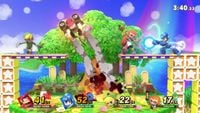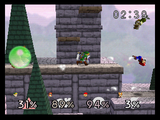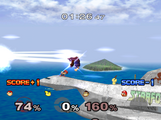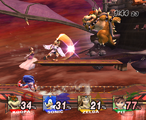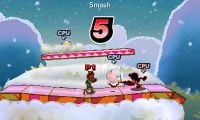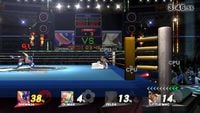Time: Difference between revisions
No edit summary Tag: Mobile edit |
(→Trivia: Battlefield and Final Destination in Ultimate is also acceptable. Just choose a Street Fighter, Splatoon, or Mario song and you’re all set.) |
||
| Line 26: | Line 26: | ||
**In Suzaku Castle's case, this only happens if the music currently playing is {{SSB4MusicLink|Street Fighter|Ryu Stage Type A}}/[[List of SSB4 Music (Street Fighter series)#Ryu Stage Type B|B]] or {{SSB4MusicLink|Street Fighter|Ken Stage Type A}}/[[List of SSB4 Music (Street Fighter series)#Ken Stage Type B|B]], as well as the stage themes of E. Honda, Chun-Li, Blanka, Zangief, Guile, Dhalsim, Balrog, Sagat, Vega, M. Bison, Dee Jay, T. Hawk, Fei Long, and Cammy in ''Ultimate'' with both types. | **In Suzaku Castle's case, this only happens if the music currently playing is {{SSB4MusicLink|Street Fighter|Ryu Stage Type A}}/[[List of SSB4 Music (Street Fighter series)#Ryu Stage Type B|B]] or {{SSB4MusicLink|Street Fighter|Ken Stage Type A}}/[[List of SSB4 Music (Street Fighter series)#Ken Stage Type B|B]], as well as the stage themes of E. Honda, Chun-Li, Blanka, Zangief, Guile, Dhalsim, Balrog, Sagat, Vega, M. Bison, Dee Jay, T. Hawk, Fei Long, and Cammy in ''Ultimate'' with both types. | ||
**In Moray Towers' case, this occurs if a regular song from either ''Splatoon'' game is used depending on which game in the ''Splatoon'' series. | **In Moray Towers' case, this occurs if a regular song from either ''Splatoon'' game is used depending on which game in the ''Splatoon'' series. | ||
**In version {{h2|List of updates (SSBU)|8.1.0}} of ''Ultimate''; Battlefield, Final Destination, Small Battlefield, and Big Battlefield share the same trait when using stage music from ''Street Fighter'', ''Splatoon'' or ''Super Mario''. | |||
{{SSBMenus}} | {{SSBMenus}} | ||
Revision as of 12:10, January 8, 2021
Time is the default rule setting in Versus Mode in which the winner is determined by whoever gains the most points when the match timer reaches an inevitable time out. A point is gained by KO'ing an opponent, while falling or self-destructing causes a player to lose a point. A team attack KO causes both the attacker and the KO'd player to lose a point. In Super Smash Bros. Melee, the number of points lost for SD'ing can be changed to 0, 1, or 2. This returns in Super Smash Bros. 4, but 0 is no longer an option. The number of points each player has is usually invisible during play, although it can be made visible through the unlockable Score Display setting from Melee onward or during replays in Brawl, or revealed through the big screen on Pokémon Stadium and Pokémon Stadium 2. In Ultimate, the player with the most points will occasionally glow regardless of whether the score display is enabled.
When the timer reaches five seconds, the announcer will start the final countdown before calling out "TIME!" (TIME UP in Smash 64 for all regions, Japanese (Melee onwards), Korean and Chinese versions) to signal the end of the match. If there is a tie for the most points when time expires, Sudden Death occurs between all tied players. The player who scores the final hit wins Sudden Death and therefore the match.
The length of a match can be set to any whole number of minutes from 1 to 99, as well as infinite time for a match that cannot end without quitting via resetting or manually shutting off the game console. In addition, Super Smash Bros. Ultimate includes two additional lengths: 1:30 and 2:30.
In the first three games, the minutes in the timer would go past 60 when matches longer than an hour were played. This was changed in Smash 4, which added an extra digit to the timer if the match timer is longer than one hour.
Gallery
A time match in Super Smash Bros. between Link, Donkey Kong, Mario, and Fox on Hyrule Castle.
A time match in Melee between Ness, Donkey Kong, Pichu and Mario on Corneria; here, Ness has just scored a point for KOing Mario, who loses a point in turn.
A time match in Super Smash Bros. for Nintendo 3DS between Mii Brawler, Olimar, Mr. Game & Watch, and Jigglypuff on Yoshi's Island with five seconds remaining on the timer.
A time match at the Boxing Ring in Super Smash Bros. for Wii U between Greninja, Olimar, Zelda, and Little Mac.
- SSBUFinalSecondsFinalDestination.jpg
The final five seconds of the match in Ultimate at Final Destination.
Trivia
- In a demo of Super Smash Bros. for Wii U, a match lasted 1 minute and 30 seconds, which cannot occur in regular gameplay; but it can in Ultimate.
- The Training mode in all the games is programmed as an infinite time match.
- Mushroom Kingdom, Mushroom Kingdom, Mushroom Kingdom II, Suzaku Castle and Moray Towers are the only stages in which the music changes when there are 30 seconds left in a timed match.
- In Suzaku Castle's case, this only happens if the music currently playing is Ryu Stage Type A/B or Ken Stage Type A/B, as well as the stage themes of E. Honda, Chun-Li, Blanka, Zangief, Guile, Dhalsim, Balrog, Sagat, Vega, M. Bison, Dee Jay, T. Hawk, Fei Long, and Cammy in Ultimate with both types.
- In Moray Towers' case, this occurs if a regular song from either Splatoon game is used depending on which game in the Splatoon series.
- In version 8.1.0 of Ultimate; Battlefield, Final Destination, Small Battlefield, and Big Battlefield share the same trait when using stage music from Street Fighter, Splatoon or Super Mario.
| Super Smash Bros. menu items | |
|---|---|
| VS Mode | VS Start (Team Battle) · Rule · Time / Stock · VS Options |
| 1P Mode | 1P Game · Training Mode · Bonus 1 Practice · Bonus 2 Practice |
| Option | Sound · Screen Adjust · Backup Clear |
| Data | Characters · VS Record · Sound Test |
| Unused | Debug menu |
| Super Smash Bros. Melee menu items | |
|---|---|
| Vs. Mode | Melee (Time · Stock · Coin Battle · Bonus · Team Battle) · Custom Rules · Special Melee · Tournament Mode · Names |
| 1-P Mode | Regular Match (Classic Mode · All-Star Mode · Adventure Mode) · Event Match · Stadium (Target Test · Home-Run Contest · Multi-Man Melee) · Training |
| Trophies | Gallery · Collection · Lottery |
| Options | Rumble · Sound · Screen Display · Language · Erase Data |
| Data | Snapshots · Melee Records · Sound Test · Archives (NTSC only) · How to Play (PAL only) |
| Unused | Debug menu · Debug sound test menu |
| Super Smash Bros. Brawl menu items | |
|---|---|
| Group | Brawl (Time · Stock · Coin Battle · Team Battle) · Rules · Special Brawl · Rotation · Tourney · Names |
| Solo | Classic · All-Star · Adventure Mode: The Subspace Emissary · Events · Stadium (Target Smash!! · Home-Run Contest · Multi-Man Brawl · Boss Battles) · Training |
| Wi-Fi | Spectator Mode · With Anyone · With Friends |
| Vault | Trophies & Stickers (Trophy Gallery · Trophy Hoard · Coin Launcher · Sticker Album · Sticker Center) · Stage Builder · Album · Challenges · Replays · Masterpieces · Chronicle |
| Options | Screen · Deflicker · Rumble · Controls · Sound · My Music · Erase Data |
| Data | Movies · Records (Group Records · Brawl Records · Notices) · Sound Test |
| Super Smash Bros. for Nintendo 3DS menu items | |
|---|---|
| Smash | Smash (Solo · Group · Time · Stock · Team Battle) · Rules |
| Smash Run | Solo · Group · Custom · Select Music |
| Games & More | Classic · All-Star · Stadium (Multi-Man Smash · Target Blast · Home-Run Contest) · Training · Custom · amiibo · Vault (Trophies · Trophy Rush · Album · Replays · Sounds · Records · Tips) · Options (Controls · Sound · Character Outline · Damage Display · Internet Options) |
| Online | Spectator Mode · With Anyone (For Fun · For Glory) · With Friends · Conquest · Share |
| Other | Challenge · StreetPass · Wii U |
| Super Smash Bros. for Wii U menu items | |
|---|---|
| Smash | Smash (Time · Stock · Coin Battle · Team Battle) · 8-Player Smash · Special Smash · Rules · Controls |
| Games & More | Classic · All-Star · Stadium (Target Blast · Home-Run Contest · Multi-Man Smash) · Training · Events · Special Orders (Master Orders · Crazy Orders) · Custom · Stage Builder · amiibo · Vault (Trophies · Trophy Rush · Album · Replays · Movies · Sounds · Records · Tips · Masterpieces) · Options (Controls · Sound · My Music · Internet Options) |
| Online | Spectator Mode · With Anyone (For Fun · For Glory) · With Friends · Online Events (Tourney · Conquest) · Share |
| Other | Challenge · Smash Tour · 3DS |
